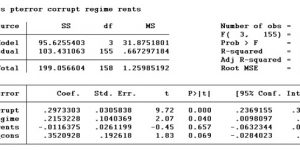I was trained in econmetric methods at the University of Michigan during my PhD coursework.
My dissertation "Local Environments and Canadian Voting" used standard regression-based techniques on survey data merged with census data. One paper, subsequently published as "The Simplest Shortcut of All: Socio-demographic characteristics and electoral choice" used a conditional logit model to estimate the impact of party leaders' characteristics on the choices made by voters choosing among the parties.
I have used modelling and estimation methods for time-series-cross-section data extensively.
I began teaching Stata in computer labs at Michigan. At UBC I have frequently taught the undergraduate required introduction to statistics and data analysis course (POLI380), a 4th-year seminar on quantitative methods, and the graduate-level introduction to regression-based methods (POLI572).
I was involved in an extensive UBC project on how we teach introductory statistics, resulting in materials available at Statspace.

I am not a natural math person. It was a struggle to get to an expert level in econometrics and I hope that this gives me an advantage in helping others learn these skills. It certainly did teach me the need to focus, practice, and work hard to learn things that don't come altogether naturally.